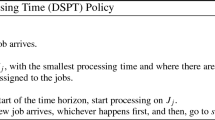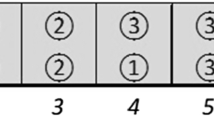Abstract
This paper addresses the non-preemptive single machine scheduling problem to minimize total tardiness. We are interested in the online version of this problem, where orders arrive at the system at random times. Jobs have to be scheduled without knowledge of what jobs will come afterwards. The processing times and the due dates become known when the order is placed. The order release date occurs only at the beginning of periodic intervals. A customized approximate dynamic programming method is introduced for this problem. The authors also present numerical experiments that assess the reliability of the new approach and show that it performs better than a myopic policy.
Similar content being viewed by others
References
Baker, K. R., & Bertrand, J. W. M. (1982). A dynamic priority rule for scheduling against due-dates. Journal of Operations Management, 3, 37–42.
Bergamaschi, D., Cigolini, R., Perona, M., & Portioli, A. (1997). Order review and release strategies in a job shop environment: a review and a classification. International Journal of Production Research, 35, 399–420.
Bertsekas, D. P., & Tsitsiklis, J. N. (1996). Neuro-dynamic programming. Belmont: Athena Scientific.
Du, J., & Leung, J. Y.-T. (1990). Minimizing total tardiness on one machine is NP-hard. Mathematics of Operations Research, 15, 483–495.
de Farias, D. P., & Van Roy, B. (2003). The linear programming approach to approximate dynamic programming. Operations Research, 51, 850–865.
George, A., & Powell, W. B. (2006). Adaptive stepsizes for recursive estimation with applications in approximate dynamic programming. Machine Learning, 65, 167–198.
Kanet, J. J. (1986). Tactically delayed versus non-delay scheduling: an experimental investigation. European Journal of Operational Research, 24, 99–115.
Kanet, J. J., & Li, X. (2004). A weighted modified due date rule for sequencing to minimize weighted tardiness. Journal of Scheduling, 7, 261–276.
Kanet, J. J., & Sridharan, V. (2000). Scheduling with inserted idle time: problem taxonomy and literature review. Operations Research, 48, 99–110.
Lee, J. H., & Lee, J. M. (2006). Approximate dynamic programming based approach to process control and scheduling. Computer and Chemical Engineering, 30, 1603–1618.
Powell, W. B., & Van Roy, B. (2004). Approximate dynamic programming for high dimensional resource allocation problems. In J. Si, A. G. Barto, & W. B. Powell II (Eds.), Handbook of learning and approximate dynamic programming. New York: IEEE Press.
Powell, W. B. (2007). Approximate dynamic programming: solving the curses of dimensionality. Hoboken: Wiley.
Pinedo, M. (2002). Scheduling: theory, algorithms, and systems. Upper Saddle River: Prentice-Hall.
Sen, T., & Gupta, S. K. (1984). State-of-art survey of static scheduling research involving due dates. OMEGA, 12, 63–76.
Sen, T., Sulek, J. M., & Dileepan, P. (2003). Static scheduling research to minimize weighted and unweighted tardiness: a state-of-the-art survey. International Journal of Production Economics, 83, 1–12.
Sridharan, V., & Zhou, Z. (1996). Dynamic non-preemptive single machine scheduling. Computers and Operations Research, 23, 1183–1190.
Spivey, M. Z., & Powell, W. B. (2004). The dynamic assignment problem. Transportation Science, 38, 339–419.
Sutton, R., & Barto, A. (1998). Reinforcement learning. Cambridge: MIT Press.
Author information
Authors and Affiliations
Corresponding author
Additional information
D.P. Ronconi was supported by CNPq (Grants 486124/2007-0 and 307399/2006-0) and FAPESP (Grants 06/03496-3 and 06/53440-4).
Rights and permissions
About this article
Cite this article
Ronconi, D.P., Powell, W.B. Minimizing total tardiness in a stochastic single machine scheduling problem using approximate dynamic programming. J Sched 13, 597–607 (2010). https://doi.org/10.1007/s10951-009-0160-6
Published:
Issue Date:
DOI: https://doi.org/10.1007/s10951-009-0160-6




